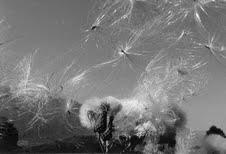April 22, 2013
Sometimes we complain about the winds and we consider them oppressive and annoying because they freeze the neck, or we want them in the warm and pleasant caress the cheeks. If then they spill splashing water, we respond with repercussions of ancestral curses.
The phenomena are expected and almost obvious from those accompanied the move. The wind passes and he has similarities with what is destined to disappear. It is the home state of the analogy between the word and the wind. We are solid, with our feet firmly on the ground. The horizon is the reference that provides and indicates the transition of the Sun and Moon, and the shape of the places where we ourselves transiting.
In Italy we depend on the winds of distant places. The alternation of heat and cold, where it is underpinned by seasonal cycles, it takes on different connotations for each year the winds that come from the Azores and from the Sahara.
The Azores anticyclone and high pressure African play continuously between them. Cleaning is one, and the other is wet. They appear exclusively, or coupled.
image taken HERE
We despise the air and see the clouds, but we depend on them. A variation or their whim, however, affects the way we live, rain or drought, or moisture. They delay the advent of spring, and anticipate the summer. They linger in the fall. Our way of life, from going out or not, the idea of cold and warm, our mood, depends on the unpredictable their incessant evolution.
The cold winds of the East as the Brujan are constant, precise, direct like a train, but they live in the house of winter. And here in Italy we have different perceptions. In the Tyrrhenian Sea to the Apennines holding back the winds of the East and those of the polar cold. The Azores anticyclone and high pressure African, give both cascades of moisture, in the Po Valley, Sicily and Sardinia. In the Ionian these two jokers quarrel with the shower heads of the Middle East, and their oscillating between drought or frost as if every time we had for the first.
The same glaciations have had easy game when the winds of the Azores have been lazy in the Atlantic and high pressure African, shy, remained in the Sahara. We draw from the fruits and thorns, sometimes we fight. But it is a rigged match. We are also made of wind, in the heart and in issuing of the voice, and in the interplay between the eardrum and Eustachian tube.
And of all the sorrows and pains, we sentiamoe The Wind That Shakes or pushes the branches, or that he travels and appears in the narrow streets and the walls of the houses, he informs us of the time, of our body that is made by him, and he leads us to the places still hidden from our sight.
We are nourished of the wind, we are in the wind, because he is an indicator of becoming and time. We, the men made from water and dust, we are born with the wind.
By Rainer Maria Rilke (my traduction)
The awakening of the wind
In the middle of the night, sometimes, it happens
you wake up, like a child, the wind.
Only, slowly, he comes down the path,
and he enters the sleeping village.
He gingerly strip, until the fountain;
Then he pauses, unspoken, listening.
The houses sit pale, around;
and all the oaks are silent.
The poem is taken HERE
And the wind is always the child: he is born every time. He is not polite at first. He always wants to play. Wild, irreverent, mischievous, wretched occasionally, but he always brings countless gifts from one part of the globe.
To listen to “The Stone and the Wind” by Aldo Tagliapietra click HERE
This post is also available in: Italian
